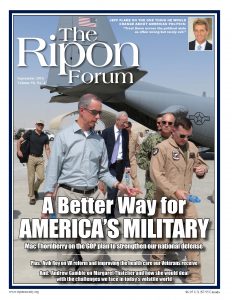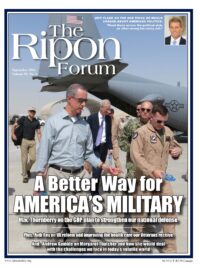 Winston Churchill once said that “Democracy is the worst form of government, except for all the others.”
Winston Churchill once said that “Democracy is the worst form of government, except for all the others.”
As we approach the 2016 general election, it often seems like this year’s presidential candidates are putting that notion to the test.
But for as much as Americans may be frustrated with the individuals who are seeking to lead our democracy, it may be a good time to remember the individuals who are working to defend it.
For the past 15 years, the men and women of the United States Armed Forces have been putting their lives on the line trying to protect our country and make sure that the kind of horrible attacks we experienced on September 11, 2001 never happen again.
During this time, it has become very easy to forget that the country remains at war. Yes, we honor our service members at sporting events. And yes, we pay tribute to their service on holidays and on other occasions throughout the year. But these honors and tributes are meaningless if we fail to give them what they need when they are in harms’ way.
As House Armed Services Committee Chairman Mac Thornberry writes in this latest edition of The Ripon Forum: “The next President will confront two realities. One is that the world has grown more dangerous under President Obama’s watch. The second is that America’s military is approaching a crisis point.” Thornberry is leading an effort in Congress to avert this readiness crisis by providing them with the resources and equipment they need to keep America secure.
According to Justin Johnson with the Heritage Foundation, this effort could not come soon enough. Since 2011, he writes: “the defense budget has been cut by 25 percent in real terms, even as operations in Afghanistan and elsewhere continue. We now face a potentially deadly storm of rising threats, major ongoing operations, and dramatic defense budget cuts.”
If there is one thing our troops in the field do not need, it is micromanagement from Washington. And yet as Luke Strange of the American Enterprise Institute notes, that is something they have faced in recent years as the National Security Council has expanded in size. “As the NSC staff has grown to around 400 people,” he states, “critics – including former members of the Obama Cabinet – have faulted it for strategic drift, inefficiency, and micromanagement of the uniformed military.” Johnson writes about an effort underway on Capitol Hill to curb the NSC’s authority.
In addition to improving military readiness, Congress also must make sure our troops are cared for after they leave the battlefield. Veterans’ health care has been a longstanding priority for our country. In recent years, it’s also become an increasing challenge – in large part, Avik Roy writes, because of the way care is administered by the Department of Veterans Affairs. “The most important thing to understand about VA care,” writes Roy, who co-chaired task force on the subject, “is that it is one of the few examples in the industrialized world of fully socialized medicine.” With surveys indicating that “overwhelming majorities of veterans want private options,” Roy also discusses a bipartisan plan that would provide just that.
In addition to focusing on “A Better Way for America’s Military,” this latest edition of the Forum also features an essay by Professor Andrew Gamble of Cambridge about the late British Prime Minister Margaret Thatcher and how she might deal with today’s global threats. Rising star Congressman Carlos Curbelo takes on longtime activist Larry Pratt in a debate about gun safety in the age of terror, while a collection of political leaders and communications professionals analyze the upcoming presidential debates.
And in our latest Ripon Profile, U.S. Senator Jeff Flake reveals his proudest achievement since coming to the Senate and the one thing in American politics that he would most like to change.
As always, we hope you enjoy this edition of The Ripon Forum, and encourage you to contact us with any thoughts or comments you may have.
Lou Zickar
Editor of The Ripon Forum
louzickar@clu.ccw.mybluehost.me




